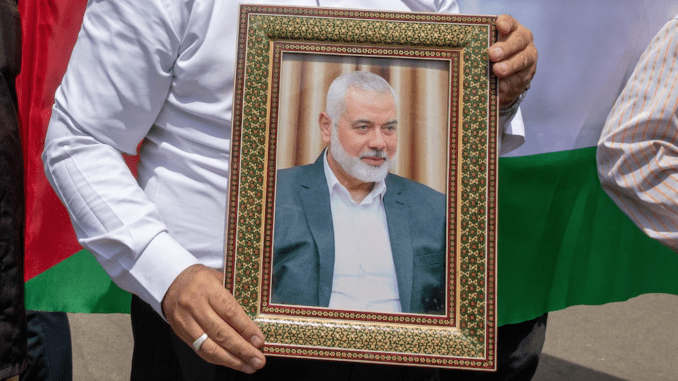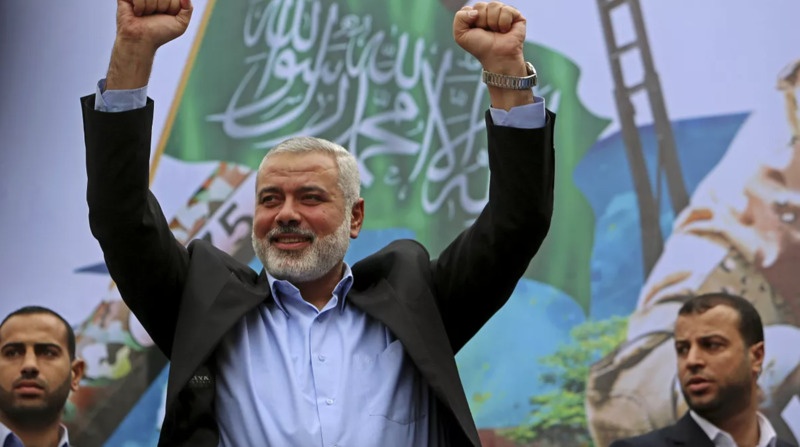
Highlights of the Report
- Ismail Haniyeh, the top political leader of Hamas, was assassinated in a strike in Tehran, Iran, shortly after attending the inauguration of Iran’s new president.
- The assassination was carried out by Israel, according to Hamas and Iranian officials, who blamed the U.S. as Israel’s “strategic ally and main supporter” for the killing.
- Haniyeh’s death came just hours after Israel carried out a strike in Beirut that killed a top commander of the Iran-backed Hezbollah militant group, further escalating tensions in the region.
- The killings have raised fears of a wider regional conflict, with Iran’s supreme leader vowing revenge against Israel and the U.N. warning of a “dangerous escalation” that could undermine efforts to broker a ceasefire in the ongoing Israel-Hamas war in Gaza.
- The assassinations could complicate U.S.-backed efforts to negotiate a ceasefire and hostage release deal in the Gaza war, as Haniyeh was a “key decision maker” in the negotiations.
- Israel has not confirmed its involvement in the strikes, but a U.S. official told CBS News that the U.S. assesses both Haniyeh and the Hezbollah commander were killed in Israeli strikes.
How Hamas’ Top Political Leader Ismail Haniyeh Was Killed in Iran
The assassination of Hamas’ top political leader, Ismail Haniyeh, in Iran’s capital Tehran has sent shockwaves through the Middle East, fueling fears of a wider regional conflict and complicating efforts to broker a ceasefire in the ongoing Israel-Hamas war in Gaza.
Haniyeh, who had been living in exile in Qatar, was killed in a predawn airstrike on a residence he was using in Tehran on Wednesday, according to Hamas and Iranian officials. The militant group blamed Israel for the attack, with Iran’s supreme leader, Ayatollah Ali Khamenei, vowing that Iran would take revenge.
The killing came just hours after Israel carried out a rare strike in Beirut, Lebanon, that targeted and killed a top commander of the Iran-backed Hezbollah militant group, Fuad Shukr. The back-to-back assassinations have raised fears of a wider regional conflict, with the United Nations warning of a “dangerous escalation” that could undermine efforts to broker a ceasefire in the Gaza war.
Haniyeh had been in Tehran to attend the inauguration of Iran’s new president, Masoud Pezeshkian, on Tuesday, along with other Hamas officials and representatives from Hezbollah and allied groups. [1] According to Iranian state media, Pezeshkian said Iran would “defend its territorial integrity, dignity, honor, and pride, and will make the terrorist occupiers regret their cowardly act.”
Hamas, the Islamist militant group that has controlled the Gaza Strip for nearly two decades, declared Haniyeh a “martyr” and said the assassination would not deter its resistance against Israel. Khalil al-Hayya, a powerful figure within Hamas who was close to Haniyeh, told journalists in Iran that whoever replaces Haniyeh will “follow the same vision” regarding negotiations to end the war and continue the group’s policy of resistance against Israel.
The killings have further complicated U.S.-backed efforts to negotiate a ceasefire and hostage release deal in the 10-month-old war in Gaza. A source with knowledge of the ongoing ceasefire talks told CBS News that Haniyeh’s assassination could complicate the mediation efforts as he was “a key decision maker” in the negotiations.
“How can mediation succeed when one party assassinates the negotiator on the other side?” Qatar’s Prime Minister Mohammed bin Abdulrahman bin Jassim Al Thani, who has been a key partner in the ceasefire talks, said in a post on social media, condemning “political assassinations.”
The U.S. has said it was not aware of or involved in the killings of Haniyeh and the Hezbollah commander. Secretary of State Antony Blinken stressed the importance of “getting a ceasefire… in the interest of putting things on a better path,” and said he wouldn’t speculate about any impact the assassinations might have on those efforts.
However, Iran’s mission to the U.N. has requested an emergency meeting of the Security Council to discuss Haniyeh’s assassination, and the country’s ambassador, Amir Saeid Iravani, said U.S. responsibility “as the strategic ally and main supporter of the Israeli regime in the region, cannot be overlooked in this horrific crime.”
Haniyeh’s killing abroad comes as Israel has struggled to achieve a clear success in targeting Hamas’ top leadership in Gaza, who are believed to be primarily responsible for planning the Oct. 7 attack that sparked the current war.
The Oct. 7 attack, which Hamas claimed responsibility for, saw the militants kill some 1,200 people and take about 240 others hostage, according to Israeli officials. The attack prompted Israel to launch a devastating military campaign in Gaza, which has killed more than 39,300 Palestinians and wounded more than 90,900, according to the Gaza Health Ministry.
Israel had vowed to kill Haniyeh and other senior Hamas figures over the Oct. 7 attack, and the assassination in Tehran was likely seen as an opportunity to target the group’s top political leader.
Haniyeh left the Gaza Strip in 2019 and spent most of his time in Qatar, where Hamas has its primary political office outside of Gaza. He was a frequent visitor to Iran, making at least four trips to Tehran in the past year to meet with Supreme Leader Khamenei and other Iranian officials, according to a CNN analysis.
During his final trip to Tehran, Haniyeh was seen smiling and clapping at the inauguration ceremony of the new Iranian president, Pezeshkian, alongside leaders from the Palestinian Islamic Jihad militant group and Hezbollah. Hours later, the strike hit the residence he was using in Tehran, killing him and one of his bodyguards.

The assassination of Haniyeh, coupled with the strike on the Hezbollah commander in Beirut, has sparked outrage across the Palestinian territories and the broader Middle East. In the Israeli-occupied West Bank, the internationally backed leader of the Palestinian Authority, President Mahmoud Abbas, condemned Haniyeh’s killing as a “cowardly act and dangerous development.”
Political factions in the West Bank also called for strikes to protest the killing, and there was shock and disbelief among Palestinians in the territory, which has never been administered by Hamas but where support for the group has increased during the war in Gaza.
The killings have also raised the specter of a wider regional conflict, with Iran’s supreme leader, Khamenei, vowing that Iran would take revenge on Israel for Haniyeh’s assassination. Iran’s powerful Revolutionary Guard also warned that Israel will face a “harsh and painful response” from Iran and its allies around the region.
Besides a direct retaliation on Israel, Iran could work to increase attacks through its network of allies, known as the “Axis of Resistance,” including Hezbollah, Hamas, mainly Shiite militias in Iraq and Syria, and the Houthi rebels who control much of Yemen.
As a show of support for Hamas, Hezbollah has been exchanging fire almost daily with Israel across the Israeli-Lebanese border in a simmering but deadly conflict that has repeatedly threatened to escalate into all-out war.
The U.S. has sought to downplay the risk of a wider war, with White House national security spokesman John Kirby saying there was “no sign that an escalation is imminent” in the Middle East and that a ceasefire agreement for Gaza was still possible. However, international diplomats working to defuse tensions have expressed alarm, with one Western diplomat warning that the strikes in Beirut and Tehran have “almost killed” hopes for a Gaza ceasefire and could push the Middle East into a “devastating regional war.”
Israel, for its part, has not confirmed its involvement in the assassinations, with Defense Minister Yoav Gallant saying only that Israel doesn’t want war after the strike on the Hezbollah commander in Beirut, “but we are preparing for all possibilities.”
The killings of Haniyeh and the Hezbollah commander have dealt a significant blow to the efforts to broker a ceasefire in the Gaza war, which has already claimed the lives of thousands of Palestinians and Israelis. With tensions soaring and the risk of a wider regional conflict looming, the path to a peaceful resolution appears increasingly uncertain.
Report prepared by Obinna Ejianya, 9News Nigeria
THE ROTTEN FISH: CAN OF WORMS OPENED OF APC & TINUBU'S GOVERNMENT OVER NIGERIA'S ECONOMIC DOWNTURN
WATCH THE CRITICAL ANALYSIS AND KNOW THE RESPONSIBLE PARTIES TO BLAME FOR NIGERIA'S ECONOMIC CHALLENGES, WHILE CITIZENS ENDURE SEVERE HARDSHIPS.Watch this episode of ISSUES IN THE NEWS on 9News Nigeria featuring Peter Obi's Special Adviser, Dr Katch Ononuju, 9News Nigeria Publisher, Obinna Ejianya and Tinubu Support Group Leader, McHezekiah Eherechi
The economic crisis and hardship in Nigeria are parts of the discussion.
Watch, leave your comments, and share to create more awareness on this issue.
#9NewsNigeria #Nigeria #issuesInTheNews #politics #tinubu THE ROTTEN FISH: CAN OF WORMS OPENED ...
DON'T FORGET TO SUBSCRIBE AND LEAVE YOUR COMMENTS FOR SUBSEQUENT UPDATES
#9newsnigeria #economia #economy #nigeria #government @9newsng
www.9newsng.com
